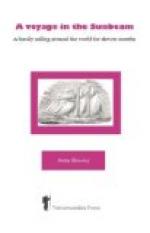Osaka used to be the emporium of all the inland commerce, and was considered the pearl of Japanese cities. After the revolution, and when the Mint was built, there was some intention of making it the capital of the empire. That idea was, however, abandoned; and the inconvenience of having the Mint so far away from the seat of government is greatly felt, all the bullion having to be sent backwards and forwards at great expense by sea. Commerce has now almost deserted Osaka, owing to the difficulty experienced by large ships in anchoring near the town, and the impossibility of their crossing the bar. The foreign consuls and representatives have all left the place for the newly established settlement at Kobe, where they feel safer, with men-of-war at anchor just under their windows.
[Illustration: Wayside Travellers.]
There was just time to go round some of the old streets, and to some of the shops, before the hour by which we were due at the station. Osaka is famous for its waxworks and theatres. Five of the best of these have, however, been burnt down within the last eighteen months, with terrible loss of life. We heard that a short time ago there was nearly being serious trouble, in consequence of one of the managers having produced on the stage, in a most objectionable manner, a representation of the cruel and unprovoked assassination of an officer and two men, part of a boat’s crew of a French ship. The English and French consuls went to the governor of the town, who promised that the piece should be stopped, and the obnoxious placards announcing the performance removed at once. But his instructions were not complied with, for the next day the piece was again performed, and the placards were still there. Some French sailors, luckily accompanied by their officers, saw the latter and wanted to tear them down; but they were persuaded to wait while the consuls were telegraphed for. They came at once, and again saw the governor, who sent some soldiers to stop the play and remove the bills; and so the affair ended peaceably.
We reached Kobe about seven o’clock, and went on board at once to dinner.
Saturday, February 10th.—We were to have gone early this morning to Arrima, a village in the mountains, situated among groves of bamboos, where there are mineral springs and a hot-water bath, in which people bathe in the old style. But the weather was impossibly bad for our intended expedition, with showers of snow and sleet. We waited till half-past eleven, and then landed and talked of going to Osaka again by train; but finally decided that even this was not practicable, and that we had better stay and potter about at Kobe and Hiogo. The children set out to buy toys, whilst I went with a lady to pay another visit to the white horse and monkeys at the temple, and then walked on to a waterfall, prettily situated in a ravine, a little way behind the town. We afterwards visited several pawnbrokers’




